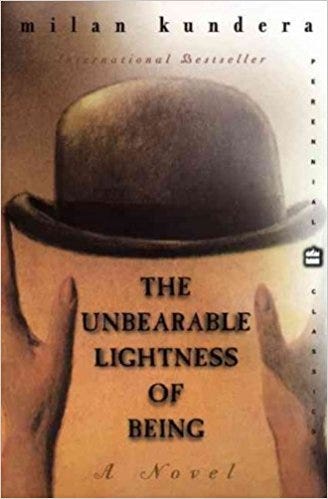When we want to give expression to a dramatic situation in our lives, we tend to use metaphors of heaviness. We say that something has become a great burden to us. We either bear the burden or fail and go down with it, we struggle with it, win or lose. And Sabina--what had come over her? Nothing. She had left a man because she felt like leaving him. Had he persecuted her? Had he tried to take revenge on her? No. Her drama was not of heaviness but of lightness. What fell to her lot was not the burden but the unbearable lightness of being.
Tomas is a distinguished surgeon in Prague; Tereza is a woman he meets at a hotel while on holiday. She follows him to Prague on a whim, coming like a "baby in a bulrush basket," as he describes it, and though they fall in love and are quickly married, he continues his many affairs with other women. His infidelities continue against the backdrop of the Soviet invasion of the Czech Republic and Tomas' political downfall; even as a window washer, blacklisted from practicing medicine, he cannot stop himself. Tereza, for her part, is tortured by Tomas' affairs but cannot leave him; she is too desperate for his love which has come to define her.
At times The Unbearable Lightness of Being struck me as little more than a cinematic romantic drama polished by sophisticated language, the kind of movie that believes there is nothing more important than the conflict between two lovers for the possession of each other, and how the shape of each one's personality stands in their way. Its notions about men and women struck me as mostly unpleasant. It might be perceptive to observe that there are two kinds of womanizers--those who are looking for a single "ideal woman" they can never find, and those who want to "possess the endless variety of the objective female world"--but I'm suspicious of Kundera's claim that women prefer the former to the latter. Furthermore, it seems to me that the reasons that men cheat on their wives are possibly the least interesting topic in the world.
On top of that, it's one of those books where women are always looking at their naked bodies in mirrors, if you know what I mean. And what am I supposed to make of the moment when Sabina, one of Tomas' former lovers, dons a bowler hat, an act that's described as doing "violence" to her body? How do women's bodies become these sacred spaces that call out for defilement? How and why do Tereza and Sabina get conscripted into that process? And why do I need to know that Tomas' favorite spot on a woman is her anus?
Much more interesting, I thought, were the novel's ideas about history and politics. Kundera's alter ego-narrator is imperious, a trait I found mostly annoying, but always ready with a theory to explain the social context in which Tomas and Tereza live and struggle. Chief among these is a discussion of the idea of eternal return and the German phrase Einmal ist keinmal, which means something like, "That which happens once doesn't happen at all." We are always looking for patterns in history and cling to the belief that it must repeat, because it formalizes our understanding of cause and effect. But history, Kundera explains, has no control group against which to measure itself, and there is no way to say that one historical decision is better than another. History, as he describes it, is a mere "sketch," and it wears lightly on the earth--as per the title.
For Tomas, this means there is no way to make a "right" decision under Soviet occupation: again and again, people demand that the distinguished surgeon sign his name to a statement he has not written. Sometimes it's Russian officials looking for a pledge of fealty to the new regime and sometimes it's Czech dissidents looking to make a statement about the treatment of political prisoners, but the repetition is never instructive, and Tomas--who refuses to sign every time--is never in possession of knowledge that will help him make these decisions which determine the path of his life. Chased away from Prague and into manual labor, Tomas and Tereza enact a very Candide-like flight from politics, happy--at least in part, and seemingly for the first time--to live in a little village with their little dog.
Marriage, too, is like history. Tomas and Tereza choose to see each other as a kind of fate which has been entrusted to them, the baby in the basket--love often begins with a metaphor, Kundera tells us, and metaphors are dangerous--but their relationship is only a sketch which they are writing. I wish, for me, it were a sketch that were a little more pleasant to witness.


No comments:
Post a Comment